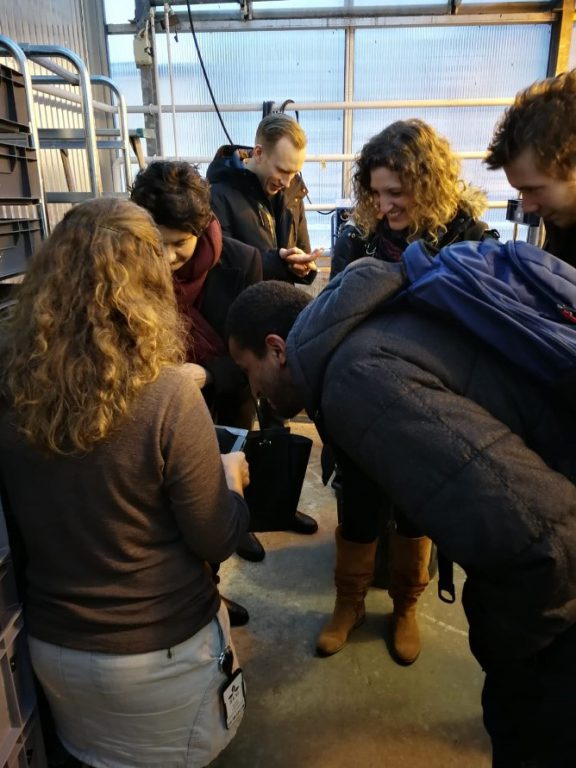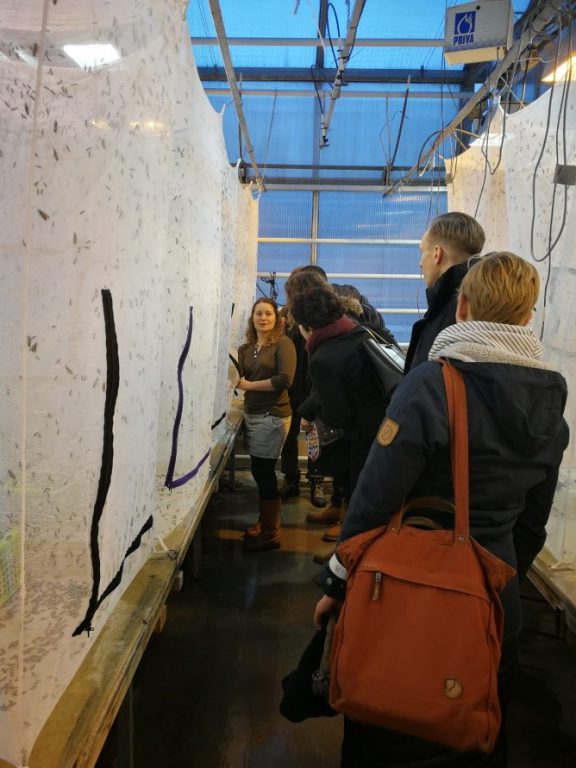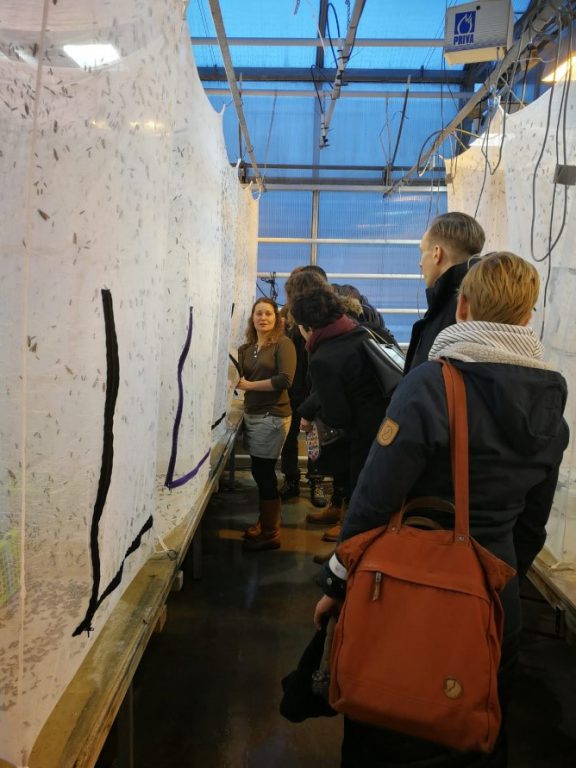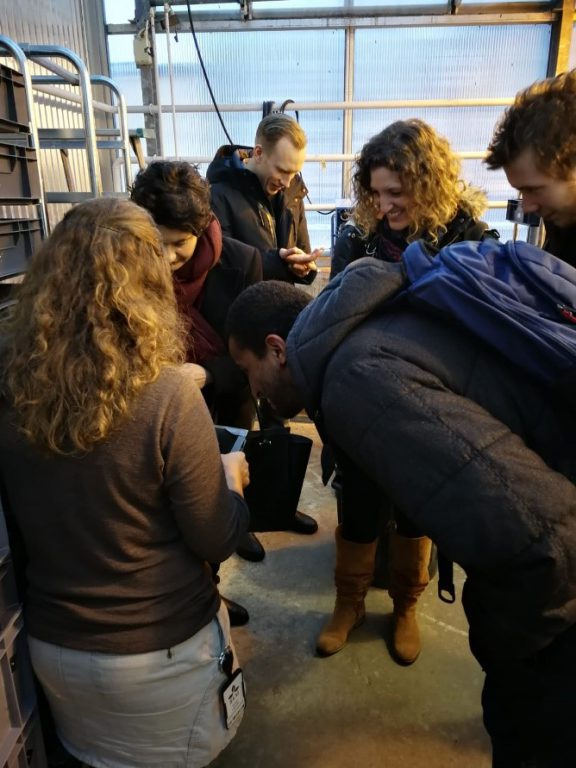Den 17 januari kom Olle Castell, Caroline Gårdestedt och Malin Denninger från Svenska Röda Korset, och Axel Wurtz och Jairo Mosquera från Stockholm Environment Institute (SEI), på besök till Cecilia Lalander och Annika Nordin i kretsloppsteknikgruppen. Det diskuterades olika möjliga tekniker för hantering av exkrement vid katastrofsituationer, främst fluglarvskompostering och termofil våtkompostering (thermophilic aerobic digestion, TAD) avhandlades då Cecilia och Annika besitter expertkunskap om dessa behandlingar. Det hanns även med ett besök till fluganläggningen. Olle Castell och Malin Denninger uppdaterade Cecilia på rådande situation i flyktinglägren i Cox’s Bazar i Bangladesh. Cecilia tillbringade i januari 2018 en månad i lägren med Svenska Röda Korset för att på plats utvärdera möjliga behandlingsalternativ. Till vår glädje fortsätter samarbetet mellan Svenska Röda Korset och kretsloppsteknikgruppen.
Author: Prithvi Simha
SIDA and SEI visited us to discuss emergency sanitation
On the 17th of January, Olle Castell, Caroline Gårdestedt och Malin Denninger from the Swedish Red Cross, and Axel Wurtz and Jairo Mosquera from Stockholm Environment Institute (SEI) came to visit Cecilia Lalander and Annika Nordin from the Environmental Engineering group. Several possible treatment technologies for the treatment of faecal sludge in emergency settings were discussed. Fly larvae composting and thermophilic aerobic digestion (TAD) were discussed in detail, as these are treatments that Cecilia and Annika have expert knowledge in. There was also time for a visit to the fly facility. Olle Castell and Malin Denninger updated Cecilia on the current situation in the refugee camps in Cox’s Bazar, Bangladesh. In early 2018, Cecilia spent one month in the camps with the Swedish Red Cross with the mission to evaluated possible treatment methods for the treatment of faecal sludge in the camps. We are pleased that the collaboration between the Swedish Red Cross and the Environmental Engineering group continues.
New Publication on removal of per- and polyfluoroalkyl substances in onsite wastewater treatment
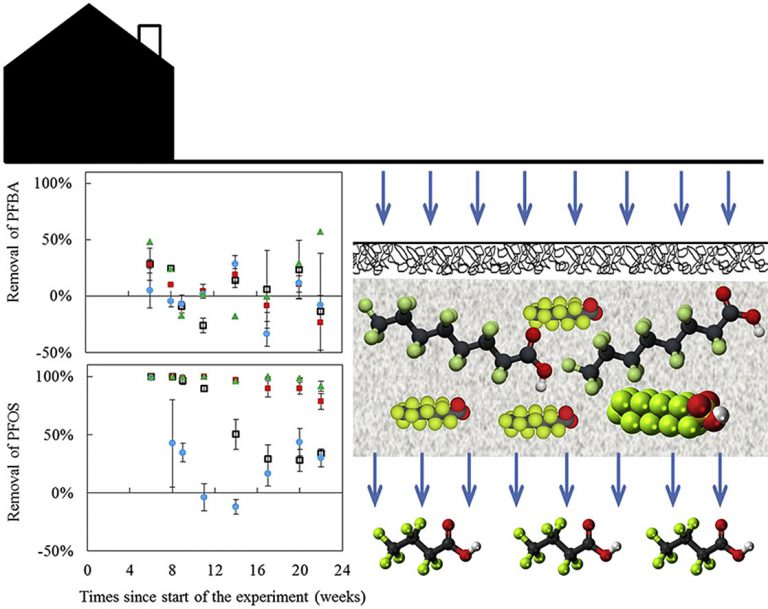
In this study, we investigated the potential of biochar filters as a replacement or complement for sand filters for removal of per- and polyfluoroalkyl substances from wastewater in onsite sewage facilities. In a 22-weeks experiment, concentrations, removal and adsorption of nine perfluoroalkyl carboxylates (PFCAs; C3- 11) and three perfluoroalkane sulfonates (PFSAs; C4, 6, 8) and one perfluorooctanesulfonamide (FOSA; C8) were investigated in four treatments: biochar with active, biochar with inactive biofilm, biochar without biofilm and sand with active biofilm. We found that biochar with no biofilm achieved higher removal efficiency (90-99%) and the adsorption capacity (73 -168 ng g-1 ) for C7-C11 PFCAs, C6, C8 PFSAs and FOSA, than the other biochar and sand treatments. For all biochar treatments, shorter-chain PFASs were more resistant to removal than longer-chain PFASs.
Nduhiu Gitahi, Doctor of Philosophy
We congratulate Mr Nduhiu Johnson Gitahi to the degree Doctor of Philosophy achieved for his thesis work: Isolation, serotyping & molecular characterization of enteric pathogens for validation of Peepoo sanitization along handling chain at Kibera, Nairobi Kenya.
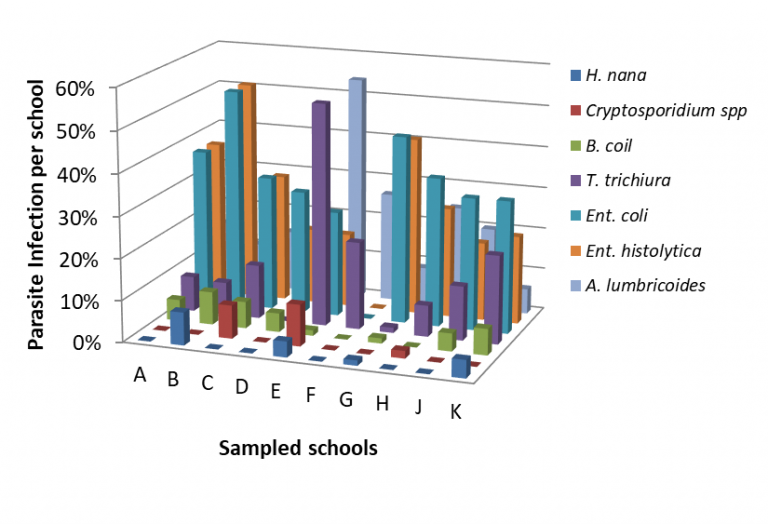
Two new interns for the urine drying project
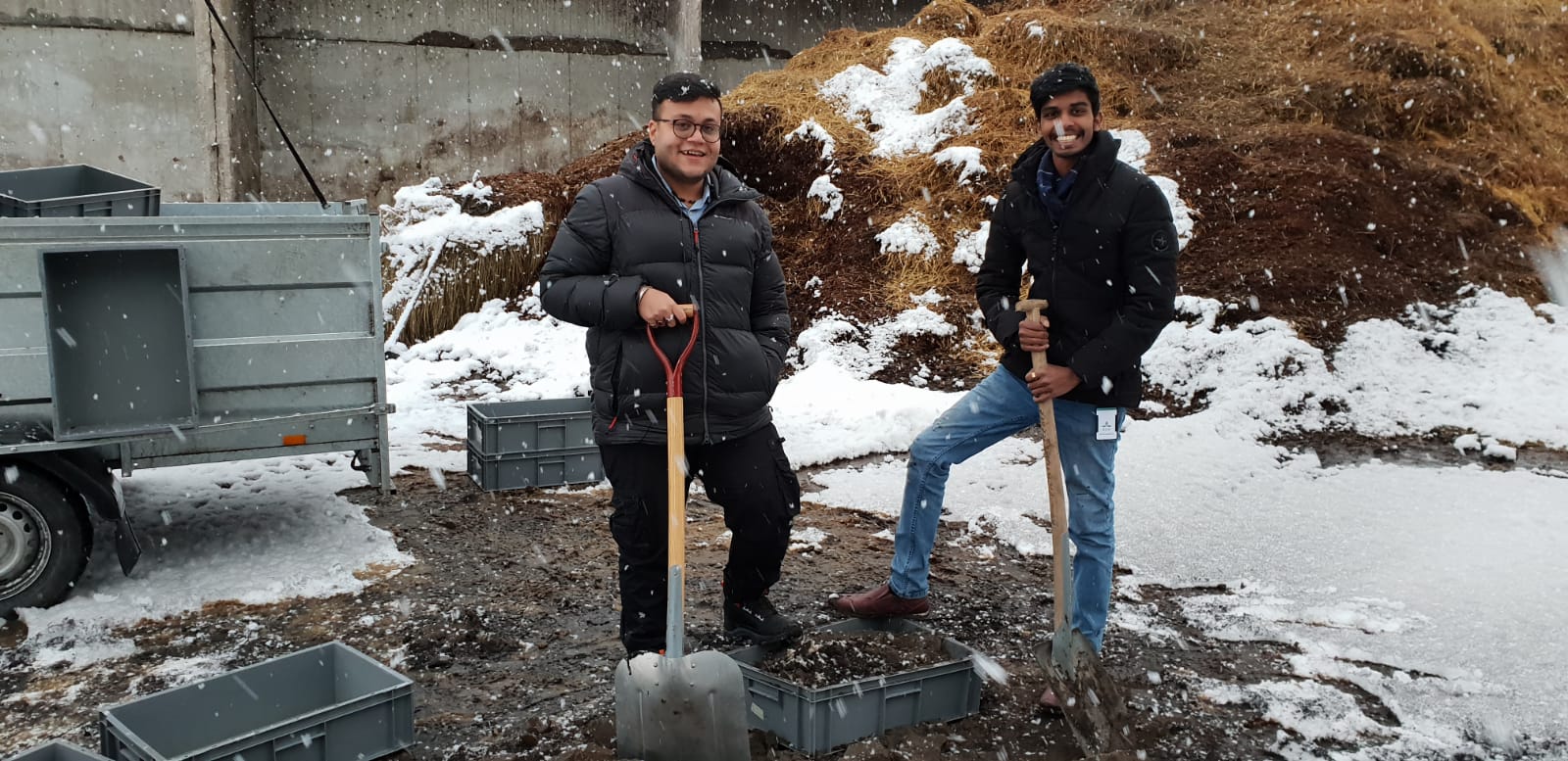
The latest additions to Kretsloppsteknik are two interns, Chinmoy Deb and Anooj Ramanathan, coming all the way from India to work on urine drying for their bachelor’s thesis. During their bachelors program, both Chinmoy and Anooj have been doing research on sanitation, working with nutrient recovery as well as removal of pharmaceutical residues from human urine. A keen interest in sanitation and hygiene technologies brings them to our group at SLU for a 3-months long internship that began in December. Over the course of the internship, they will be involved in ongoing projects related to process modelling, intensification, and optimization.
Water & Wastewater Speciality in the Journal Frontiers in Environmental Science
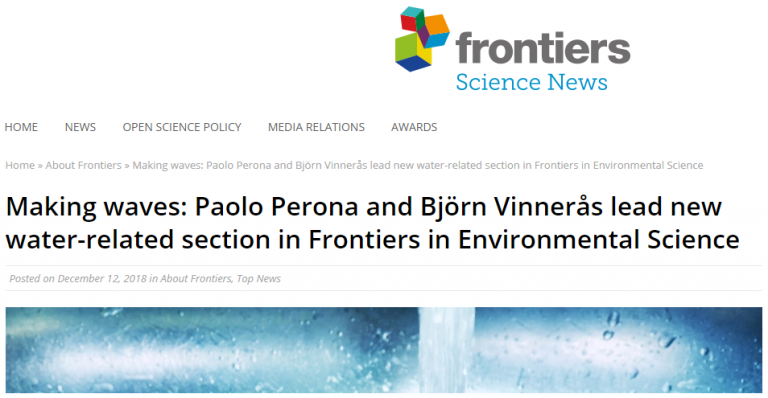
A new section about water and wastewater has been launched as a speciality section in the journal, Frontiers in Environmental Science. Björn Vinnerås together with the co-chief editor, Prof. Paolo Perona and the members of the editorial board welcome contributions to the journal. We aim at publishing pioneering, high-quality research in key areas of integrated and sustainable water and wastewater resources management. These include, for instance, uses and processes involving surface- and groundwater bodies, engineering techniques with a focus on upstream work, virtual water networks, innovative water and wastewater treatment solutions in humid, semiarid and arid regions, analytical and numerical modelling as well as the use of innovative algorithms devoted to the analysis of big-datasets. For more information see the following blog post: https://blog.frontiersin.org/2018/12/12/making-waves-paolo-perona-and-bjorn-vinneras-lead-new-water-related-section-in-frontiers-in-environmental-science/ Or directly at the home of the section, available at this link
Insects fed on waste as fish feed
As part of the result of the Vinnova financed project Five tonnes of fishes in different dishes that aims at producing fish reared exclusively on Swedish produced feed, fish reared on insect based protein were tested and evaluated against fish reared on conventional fish feed. The protein in the test feed comprised of a 1:1 mixture of pea and insect protein. The insects (black soldier fly larvae) were fed stale bread. In total, 25 kg of rainbow trout in this first trial. To the joy of all, the fish fed with insects tasted really well, which suggest that it is feasible that insect can be a part of sustainable Swedish fish feed in the future. 

Developing a serious game for resource recovery
In the project “Gamification of Sanitation Planning”, we are developing a serious game to support sanitation planning and increase the recovery of nutrients from waste flows. This fall we have had a series of workshops focusing on developing the game concept. The target group for the game is politicians and officials in decision-making positions. Other target groups are property owners, community-based organizations, students and other officials involved in sanitation planning. The aim of the game is to get the target group to understand what nutrient cycles are and what can be done to facilitate the construction of resource-recovery systems, i.e. how can different groups take responsibility? The game should also be fun to play, engaging, be able to inform about new technologies and lead to increased understanding of other actors’ perspectives. The game itself will be developed in early 2019 and be ready to test with audiences before the summer.
Utveckling av kretsloppspelet pågår
I projektet ” Gamification av sanitetsplanering” håller vi på att utveckla ett serious game för att stödja VA-planering och öka kretslopp. Under hösten har vi haft flera utvecklingsworkshop som ska leda fram till ett spelkoncept. Primärmålgruppen för spelet är politiker och tjänstemän i beslutsfattande ställning. Övriga målgrupper är fastighetsägare, samfälligheter, studenter och tjänstemän inblandade i planläggningen av en VA utbyggnad. Målet med spelet är att få målgruppen att förstå vad kretslopp för växtnäringsämne är och vad man kan göra för att underlätta att ett kretsloppsystem byggs upp, dvs. hur kan olika grupper ta ansvar? Spelet ska också vara kul att spela, engagerande, kunna informera om ny teknik och leda till ökat förståelse av andra aktörers perspektiv. Själva spelet ska utvecklas under början av 2019 och vara färdig för att testa med målgrupper innan sommaren.
Slutkonferens MACRO projektet
 Den 27 november var Kretsloppsgruppen med och presenterade resultat i MACROs slutkonferens i Stockholm. Projektet MACRO (Mat i Cirkulära Robusta system) hade för mål att stimulera innovation hos både kommuner och teknikleverantörer samt innovation kring produkter och tjänster kopplat till sorterande avloppssystem för samhällets organiska restprodukter. Projektet har bidragit till att fylla kunskapsluckor avseende både teknik och organisation. Genom MACRO skapas fler möjligheter för svenska aktörer att utveckla spetskunskap inom området vilket ökar möjligheterna för Sverige att positivt bidra till utvecklingen av framtidens hållbara städer. SLU har bidragit med forskning om potential för fluglarver kompostering av matavfall från köksavfallskvarnar och organisatorisk förutsättningar för implementering av källsorterade system inom VA-verksamhetsområde.
Den 27 november var Kretsloppsgruppen med och presenterade resultat i MACROs slutkonferens i Stockholm. Projektet MACRO (Mat i Cirkulära Robusta system) hade för mål att stimulera innovation hos både kommuner och teknikleverantörer samt innovation kring produkter och tjänster kopplat till sorterande avloppssystem för samhällets organiska restprodukter. Projektet har bidragit till att fylla kunskapsluckor avseende både teknik och organisation. Genom MACRO skapas fler möjligheter för svenska aktörer att utveckla spetskunskap inom området vilket ökar möjligheterna för Sverige att positivt bidra till utvecklingen av framtidens hållbara städer. SLU har bidragit med forskning om potential för fluglarver kompostering av matavfall från köksavfallskvarnar och organisatorisk förutsättningar för implementering av källsorterade system inom VA-verksamhetsområde. 

